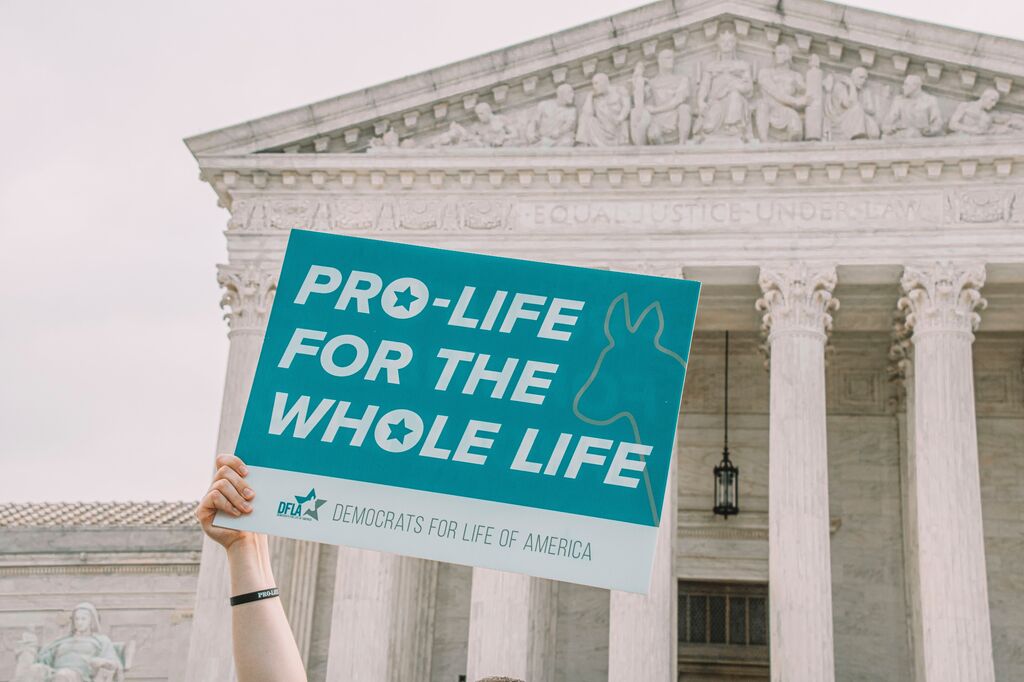Roe v Wade: At Least America is Still Debating Abortion

Today, we read some staggering news from the United States. Justices on the US Supreme Court handed down a majority (6-3) opinion which overturns Roe v Wade, the 1973 ruling that made access to abortion a constitutional right. This outcome had been trailed after a leaked document was picked up by the press earlier this year. Now the official ruling is out and it’s broadly in line with the draft. Pro-life activists will be delighted, and pro-abortion activists will be enraged.
It’s important to note that this decision does not automatically mean abortions across America will stop. Abortion will remain a matter for individual states to decide on. Some states will pass legalisation in response to the ruling that bans abortion, others will do the opposite. What we all need to understand is the abortion debate in America is far from over. As one seasoned campaigner said: “This decision changes everything. And ends nothing.”
The fact the Roe v Wade ruling didn’t make it to its 50th anniversary is astonishing, given how deeply embedded abortion has become in Western culture. As for its impact of the Supreme Court’s ruling in the UK, there will probably be little impact at all. It’s certainly a significant development that will elicit much conversation, but the UK is vastly different to the US both socially and politically. And on this side of the pond, we aren’t allowed to debate the rights and wrongs of abortion.
Sure, there’s been some debate in recent years about sex-selective abortion. There has also been some debate about abortion in Northern Ireland. And whether certain sections of our law should be repealed to move abortion out of criminal law altogether. What we do not see is a genuine, substantive debate about the morality of abortion. Questioning the practice remains the last taboo thing in our society. It is vanishingly rare to see anything approaching a debate on ethics.
In the draft of the Supreme Court’s decision, leaked in May this year, Judge Alito said that abortion is fundamentally different from other topics because, as both Roe and Casey acknowledged, it ends what those legal rulings described as “fetal life” or an “unborn human being”. This line from Judge Alito gives us a fascinating insight into the fact that in America, the abortion debate is still being conducted at a fundamental level: is abortion moral?
The debate in America is still about what rights a preborn baby has. It’s about how to balance the mother’s rights and the preborn baby’s right to life. Conversely, in the UK, we cannot even pass reforms to make abortions based on sex, or disability, illegal. Discrimination that would be illegal if directed towards human beings outside the womb is perfectly legal when directed towards human beings inside the womb. Few in the political class question it.
Here in the UK, we do not seem to allow any debate about abortion. We’ve ended up in an absurd situation where, at the political level, abortion is untouchable, despite debates being permitted and entered into on all sorts of other contentious issues. Perhaps this is an indication that parliamentarians are more extreme in their views on abortion than the wider British public, and other liberal democracies across the West.
The UK already has one of the most permissive laws on abortion in the world – more than many nations in Europe, and many US states. Our regime results in an astonishing number of terminations each year, with 2021 seeing a record high of 214,869 abortions in England and Wales. There were 91,313 repeat abortions, an almost 20 per cent rise in late term abortions based on disability, and 40 abortions due to a baby having a cleft palate. Yet few in power seem to care.
I am not optimistic that Roe v Wade being overturned is going to change the status quo in the UK and see substantive change in our laws governing abortion. Not now, and not in the next few years. I do hope, however, that it will put the issue more on the map here. It is right for society to grapple with weighty moral and ethical issues and ask if consensuses on any given issue are wrong. The voice of those advocating for the rights of the unborn child must be heard and taken seriously.
James Mildred is the Director of Communications and Engagement at CARE






